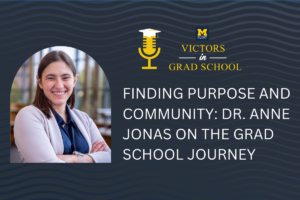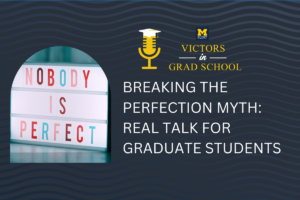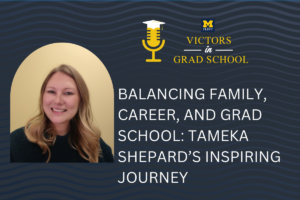Embarking on the journey of graduate school is a significant milestone filled with challenges and opportunities for growth. In this week’s Victors in Grad School podcast we talk with Michael Weber, a retired General Motors global systems engineer, shared his insights and experiences about his transition from the workforce to graduate school. In this blog post, we will delve into Michael’s journey, his decision to pursue a Master’s degree in Business Administration (MBA) at the University of Michigan-Flint, his experiences balancing work, family, and education, and the valuable lessons he learned along the way. Here are key insights and tips for navigating the dynamic landscape of graduate education, based on Michael Weber’s enriching conversation with Dr. Christopher Lewis.
Deciding to Pursue Graduate Education
Michael expressed three compelling reasons for his decision to pursue a master’s degree. He viewed it as a means to advance his career, gain knowledge about business, and uphold his belief in lifelong learning. This underscores the importance of aligning personal and professional goals with the decision to pursue graduate education. Aspirants should introspect, identify their motivations, and consider the potential impact of advanced education on their careers and personal development.
Choosing the Right Degree Program
Michael’s transition from an undergraduate degree in engineering to an MBA sheds light on the significance of selecting a degree aligned with one’s interests and career aspirations. His decision was influenced by a genuine interest in business, a background in leadership, and a recognition of potential opportunities outside the field of engineering. Prospective graduate students can leverage this insight by critically evaluating their passions, analyzing industry trends, and assessing the potential value of different degree programs in relation to their career trajectories.
Selecting the Right Graduate Program
Michael’s decision to pursue his MBA at the University of Michigan Flint was influenced by various factors, including proximity, program structure, and personal recommendations. This highlights the importance of considering logistical factors, alumni experiences, and program offerings when choosing a graduate school. Prospective students should carefully assess a program’s curriculum, faculty expertise, networking opportunities, and potential for practical applications in their desired career paths.
Balancing Work, Family, and Education
A significant aspect of Michael’s journey was the challenge of balancing work responsibilities, family commitments, and academic pursuits. His pragmatic approach involved effective time management, open communication with his family, and seeking support from his employer. This emphasizes the need for aspiring graduate students to develop robust time management skills, establish a strong support system, and communicate transparently with their employers and families as they navigate the demands of graduate education.
Adapting to a Different Learning Environment
As Michael transitioned from a science-based curriculum to a business-focused program, he encountered a shift in learning methods, faculty expectations, and academic outcomes. His experience underscores the importance of adaptability, open-mindedness, and the willingness to embrace diverse learning approaches when stepping into a new academic domain. Prospective graduate students should prepare for an adaptive learning experience, assimilate interdisciplinary knowledge, and be receptive to new methods of inquiry and analysis.
The Impact of Graduate Education on Career Growth
Following the completion of his MBA, Michael observed significant personal and professional growth. His enhanced confidence, refined leadership skills, and expanded network paved the way for career progression within General Motors. This exemplifies the potential positive impact of graduate education on career advancement, skill diversification, and professional recognition. Aspirants should recognize the long-term value of graduate education in cultivating a robust skill set, expanding career opportunities, and fostering continuous personal development.
Advice for Prospective Graduate Students
Drawing from his experience, Michael offers crucial advice for individuals considering graduate education. He emphasizes the need for a clear understanding of personal goals, meticulous planning, and assessing the potential return on investment. Aspirants are encouraged to conduct thorough self-assessment, evaluate the feasibility of pursuing a graduate degree, and develop a well-defined plan that aligns with their career aspirations and personal growth objectives. Michael’s emphasis on goal clarity and strategic planning serves as a valuable compass for those navigating the complexities of graduate education.
Michael Weber’s journey from a seasoned engineer to a successful graduate student and, subsequently a distinguished global systems engineer at General Motors offers a wealth of insights and guidance for prospective graduate students. His experiences underscore the importance of aligning personal aspirations with educational pursuits, adapting to new learning environments, and leveraging graduate education as a catalyst for career growth and personal development. As individuals embark on the transformative journey of graduate education, they can draw inspiration from Michael’s story, integrate his advice into their decision-making process, and navigate their unique paths with clarity, resilience, and purpose.
If you want to reach Michael contact him at mfweber112@comcast.net
This podcast is brought to you by The Office of Graduate programs at the University of Michigan-Flint. If you’re still wondering about other things to consider when it comes to graduate school, you can also contact the Office of Graduate Programs at UM-Flint. We’re here to answer questions Monday – Friday from 8:00 a.m. to 5:00 p.m. EST. You can also find out more about the 50+ programs that the university has to offer here.
TRANSCRIPT
Dr. Christopher Lewis [00:00:01]:
Welcome to the Victor’s in Grad School, where we have conversations with students, alumni, and experts about what it takes to find success in graduate school.
Dr. Christopher Lewis [00:00:11]:
Welcome back to Victors in Grad School. I’m your host doctor Christopher Lewis, Director of graduate programs at the University of Michigan Flint. Really excited to have you back again this week. Every week, I love sitting down with you, being able to talk to you about The journey that you’re on the journey that you’re on to moving toward graduate school, moving through graduate school, moving beyond graduate school. I know that you may be in a a spot right now where you’re just thinking about grad school or you could be in grad Or you could be thinking about that light at the end of the tunnel and you’re almost done and ready to head off into the workforce. No matter where you are, It’s so important that you find success in that journey, and that’s what this podcast is all about. This podcast is all about helping you to find success in the journey that you’re on. I love being able to sit down with you and being able to introduce you to people that have gone before you, that have had the opportunity to go to graduate school, have found success in that journey themselves, and they are able to share that experience with you.
Dr. Christopher Lewis [00:01:17]:
Today, we’ve got another great guest with us. Michael Weber is with us today, and Michael is a he’s a retired General Motors global systems engineer when he retired from General Motors after 45 years. And in his journey with which we’re going to learn more about, he did go through his bachelor’s degree at the University of Michigan and then went beyond that To get a master’s degree from the University of Michigan Flint. So we’re gonna talk about that journey as well. Really excited to have him here. Michael, thanks so much for being here today.
Michael Weber [00:01:51]:
My pleasure.
Dr. Christopher Lewis [00:01:51]:
It is my pleasure having you here today. Love being able to hear more about your own experience. And One of the things that I love to do, 1st and foremost, is turn the clock back in time because I know that you did your undergraduate work at the University of Michigan. And then after After going to the University of Michigan and getting that bachelor’s degree in engineering, you ended up going and you Went out into the workforce, got some experience, and then after a few years, you decided, you know what? It’s time. It’s Time to come back to graduate school. Talk to me about what was going through your head as you were thinking about going back to school and why you decided to make that jump Into going to graduate school for yourself.
Michael Weber [00:02:34]:
Chris, thanks very much. There were probably 3 main reasons that I thought of, Why I need to go back to graduate school? My first one, I felt that earning a master’s degree would actually help advance me within my career. And I had a particular interest in learning more about business and how I could be a more effective, a more Appropriate leader, if you will. And I also believe in light learning, which is something that, even after all these years, I continue to still practice today. So three reasons for going back to graduate school, and I’m happy to talk about that journey.
Dr. Christopher Lewis [00:03:10]:
So one of the things that I would love to hear more about is the fact that you made a choice to go from your bachelor’s in engineering. And then as you said, you decided you wanted to go and get MBA, a master’s of business administration. You could have gone and kept going with engineering. You could have got a MSC. You could have gotten some other degree in engineering that Would have allowed you to be able to continue down the path of honing your skills in engineering, but you as you said, you You decided to get that MBA. Talk to me about the decision to get the MBA versus another type of a degree, and what made you what were some of the linchpins that made you decide that that was the right degree for you.
Michael Weber [00:03:52]:
Well, as I mentioned, I have a, an interest in business. And there were the choices that I could have made coming out of Undergraduate staying in an engineering degree for graduate school. I think probably one of my main reasons who are not continuing with the engineering degree was that I had the foundation that I needed to ensure that I was gonna be successful in what I anticipated would be going forward in the initial years of my career. But Because I felt that I had some leadership basic skills, if you will, and that I could see myself in in a management role. And my father owned a business, so I grew up in kind of a business environment. And as I began to think about what does Mike Weber wanna do Going forward with his life, I could see that the combination of my engineering degree as an undergraduate with, balance with an MBA, if you will, Learning the business aspects, how the company ran, you know, what were all the mechanisms that kept those trains on the track. I could see that I had opportunity to be able to offer things in an area beyond just engineering. And combining those 2 together, I could see a successful future for myself.
Dr. Christopher Lewis [00:05:10]:
Now I mentioned that you got your undergraduate degree at the University of Michigan and you got your Master’s degree at the University of Michigan Flint. I’m sure that you had many opportunities to be able to go to many different Schools you could have chosen to go to a lot of different universities to get that masters of business administration. What was it about the University of Michigan Flint that made
Michael Weber [00:05:33]:
you decide that that was the right program for you. 1st of all, the school is local for me. It’s it’s within a 10 mile drive from home, So a lot of convenience from that perspective. And as you mentioned, I attended the, University of Michigan with my undergraduate degree in Ann Arbor, So I had, obviously, a previous connection with the University of Michigan. This particular program offered a nighttime degree that was only 2 days a week, and it was gonna cover 3 years, and then I was gonna be complete. I had a, a colleague at work that was already enrolled in this particular program. It was a new MBA program back in the early 19 eighties, at the University of Michigan Flint. And she spoke extremely highly of, this program that was being offered.
Michael Weber [00:06:19]:
And after talking with her and putting all those pieces together, I decided that was where I was gonna start.
Dr. Christopher Lewis [00:06:24]:
Now you mentioned that the Agree for you as a nighttime program 2 nights a week. And when you have to make that transition, you took a few years off Going from your bachelor’s to your master’s, you took some years off to work and get some experience. Talk to me about that transition For yourself of being able to balance now working and going to school and family life and other things, How did you balance all of that for yourself to be able to be successful in that journey for yourself?
Michael Weber [00:06:57]:
Chris, that’s probably an extremely important question, and and I’m glad that I got a chance here to share that with you. So Here was my approach in thinking about that. 1st, again, you mentioned, roughly that I was 4 years into my career. So I first needed to make certain that I could still ensure that this was a priority with what I wanna be doing as a requirement of my job. Plus, as I said, 4 years out of undergraduate, I was out of that school routine. Secondly, I already had a toddler at home, And we were planning to add to the family while I was going to school, so I needed to ensure that I could manage that time that was necessary to put into the effort. 3rd, since we owned a home, there are necessary chores as any homeowner has to complete on a regular basis. And then finally, I was gonna be away twice a week that my son said time hour.
Michael Weber [00:07:49]:
So I needed to carve out time to be able to do my studies while I was home and, obviously, being away. So all of this was a balancing act, and it required understanding first with my wife, obviously, as well with my boss at work, and then just applying some solid time management to keep each of these requirements in check. Now fortunately, I have a very understanding wife. My son was very young at the time who conveniently went to bed early on the Nonschool nights, and I took naps on weekend afternoons, which is where I focused my reading and homework that needed to be accomplished. I also had a very understanding boss who supported my postgraduate efforts. And as long as I was meeting his expectations and completing all that I needed to Be asked of doing at work, then I was at least in check and okay with that. Now getting back into the study, the homework, Test preparation was probably the hardest, and there’s no doubt about it. So couple other things here that I’ll mention.
Michael Weber [00:08:48]:
With 6 semesters, There were 2, each for the 3 years. The 1st semester was by far the most challenged, and getting back into the school routine and adjusting my Regular life routine around school now and balancing everything else, you know, was the initial challenge. Fortunately, in the classroom, we were divided into teams of 6 students. And since we were all similar in age with similar goals and other responsibilities in life, it gave us the opportunity to easily compare notes and work with each and support each other at the same time. We also use these groups as study groups, continually checking with each other For understanding of the class material, clarification of assignments, generally helping each other to succeed overall. And I’ll also note that once the 1st semester, fortunately, was completed, the rest of the 5 went much easier as I developed a pretty good routine. I had gained confidence in myself, began doing work in doing well in the program, and I was enjoying both the class material as well as my classmates. And then finally, we also had some social events.
Michael Weber [00:09:53]:
Some were coorganized by the school and others were on our own. So the camaraderie that we have developed was extremely important and obviously very helpful.
Dr. Christopher Lewis [00:10:01]:
Mentioned that the 1st term was the hardest. And As you transitioned from not only being in a bachelor’s degree at the University of Michigan Ann Arbor To working to now being in a graduate program in a very diff different discipline, what was the hardest part In getting your mind around studying in a different way, learning in a different way that you had to grapple with, that you had to under that you had to do to be able to find success in that graduate degree itself.
Michael Weber [00:10:42]:
I think the biggest transition in making the success rate For a graduate program for me had to be time management initially. Certainly, time management between work life balance Was already a bit of a routine. 4 years out of school, we had gotten married. Life was easy and fun at the beginning. Getting a child then along the way Offered a a new dimension of time management, but now adding that other dimension of going back to graduate school on balancing everything else that I already been balancing was by far the most challenging. And how to do that? I think that I’ve been blessed in my life with reasonably good time management skills. The complexity of work was increasing. And so with along with that, there were actually some, Side programs that I remember General Motors offering and helping us all work with time management in general And then having a a basic skill set of that, but it was still the overall adjustment of the intense studying, the complexity of, You know, moving away from engineering to a degree and learning accounting and and learning all these other business kinds of things was all very new.
Michael Weber [00:11:55]:
And and so there had to be a a strong focus on that first, almost to the point that you’re putting some of the others, what other responsibilities subservient, but you had them still manage them all in check. You’d probably afford to to lessen up on some of those others So that you could really focus on being successful in that adjustment to the graduate program.
Dr. Christopher Lewis [00:12:17]:
Now one of the things that I would love to hear from you because You made the choice to go from a very science based curriculum to a, I’m gonna say, a nonscience based Curriculum when you went from undergrad to grad. And so the way that you are taught, the way that your faculty educate you is going to be very different. The outcomes are going to be different. The expectations are going to be different. And I know you said that you had an interest in leadership, Which drew you to the MBA? Did you find that there was any other types of things that you had to do differently In the way that you thought, processed, approached the education at the graduate level because it was In such a different area?
Michael Weber [00:13:04]:
Yeah. There was some difference. But because I had that strong interest in the business aspect And I had other aspects of leadership. I I grew up in the boy scouting environment. I was a patrol leader, and I did other leadership things there. When I was in college in my undergraduate work, I was a leader on campus. I was very involved in a variety of activities And recognized as such for those leadership activities, it was more of an evolution as I was moving along through the business program That I was learning other techniques. I was testing myself against things that I had done at a younger age, against some of the new opportunities that I was being taught, And then, of course, comparing notes with other colleagues that were equally experienced in some cases as I was.
Michael Weber [00:13:51]:
And so it was a further learning experience, But at the same time, a bit of a validation along the way at the same time.
Dr. Christopher Lewis [00:13:58]:
Now you completed your degree. You went back into the workforce. As you enter that workforce again after you had completed your MBA, talk to me about how that degree helped to prepare you for the work that you were doing on a day to day basis.
Michael Weber [00:14:15]:
I grew quite a bit during those postgraduate years. I gained in confidence. I was a better speaker in front of a group. Naturally, I was continuing to learn different aspects of leadership and improving in that area, and And I was a better thinker and decision maker along the way. I developed future contacts and friendships that proved useful in my career down the road. And quite frankly, I was proud of myself for completing the program in spite of the challenges that are presented. Challenges such things as learning complex subject matter, competing again in a classroom environment, needing to do well on tests, balancing the home life, particularly since our 2nd child was born Midway through the program and the grind of essentially doing 2 or you might even say 3 jobs at the same time in between homework and the graduate work. But the degree also accomplished some of the goals that I set for why I wanted to complete the degree in the 1st place.
Michael Weber [00:15:09]:
2 years following my degree, I moved into management. I was given gradually increasingly challenging work assignments. I eventually retired as a global engineering program manager, which you mentioned at the top of the broadcast here. And it was for all General Motors midsized vehicles across the globe within the body structures group, and that included significant travel and frequent exposure to top company leadership. So I credit my degree for helping me reach that level of responsibility within the company, and I enjoyed, my entire career that remained after completing my degree.
Dr. Christopher Lewis [00:15:46]:
I know that the degree that you got was a number of years back. But as you look back At your graduate education and you think about people that are thinking about graduate school right now, whether it be an MBA, A degree in engineering, whatever it may be. What are some tips that you might offer to Individuals that are thinking about graduate education that could help them to find success sooner.
Michael Weber [00:16:13]:
Chris, another great question, and I hope that My response will help others in their decision making with respect to beginning a graduate degree. I first highly recommend knowing your goals and clearly understanding why completing this degree is important to the person. That can be for several reasons, and they don’t have to be of anything that I’ve already described. Perhaps it’s to further the work that was done in an undergraduate degree. Maybe it’s Requirement of either the current job that one is involved with or requirement for the next job, whatever that might be. It may just be because of the thirst of Further knowledge learning, but be sure that the person knows why they are seeking the advanced degree because it will take sacrifice, Money and time, but if the reward equals or is greater than the efforts, then it’s worth pursuing. And other things to consider as well, And these may be obvious, but I’ll note them so that they’re not of a love. Do you have the time? And consider all aspects of what’s involved with that.
Michael Weber [00:17:15]:
Class time, travel, study, time perhaps impacts to work as well as to family and your friends. Can you afford the cost Either now or in the future. And do you have a significant other that needs to be consulted? Graduate school is a big commitment. Competition will be higher than what it was in undergraduate, And you wanna make sure that there will be a return on your investment. In other words, will you confidently be able to reach your goals Following completing that degree program, and as I noted, I found experience worthwhile and rewarding in many ways. It’s not an easy decision. And let me add this piece of advice that comes in the form of an old saying that I was continually reminded of by a chief engineer that I worked for many years. A goal without a plan is only a dream.
Michael Weber [00:18:03]:
So be sure you know why you were going after the advanced degree. And if you do And the goal is strong enough, you’ll very likely achieve that goal with a great deal of success.
Dr. Christopher Lewis [00:18:13]:
Sage wisdom, and I really appreciate you sharing that and sharing everything that shared today, Michael. If people wanna find out more about you, is there a place they could go to find out more?
Michael Weber [00:18:22]:
Yeah. I I’ll be open, and and I’ll give you my email address. It is based on my name. So m, middle initial f, w e b e r. That’s m f Weber with the numbers one one 2@comcast.net.
Dr. Christopher Lewis [00:18:38]:
Really appreciate that, Michael, and I’ll put a link in the notes today for you to be able to reach out to Michael if you’ve got Questions or wanna reach out and ask him more about his own experience. Michael, thank you so much for being here, and I wish you all the best.
Michael Weber [00:18:50]:
Chris, it was my pleasure, and I wish everyone listening to this Podcast success as well. Thank you.
Dr. Christopher Lewis [00:18:55]:
The University of Michigan Flint has a full array of masters and doctorate programs if you are interested continuing your education. Whether you’re looking for in person or online learning options, the University of Michigan Flint has programs that will meet your needs. For more information on any of our graduate programs, visit umflute.eduforward/graduateprograms To find out more. Thanks again for spending time with me as you prepare to be a victor in grad school. I I look forward to speaking with you again soon as we embark together on your graduate school journey. If you have any questions or want to reach out, Email me at flintgradoffice@umflint.edu.





